The former, of course! You're right, it is wildly implausible; the AI will pick that option a tiny fraction of the time, and there are (minor) penalties for choosing it. Since I was in control of the Curia I was able to change history, however.aussieboy said:Just a clarification:
When you mean, "the Mass and the Bible were allowed to be in the vernacular," do you mean that the Pope granted an indult, as is the case today, or is it to the exclusion of the lingua Latina? The former would be legal, though in this era somewhat implausible, while the latter would be pure, unadulterated heresy.
Honor of Lancaster: A Magna Mundi England AAR
- Thread starter dharper
- Start date
-
We have updated our Community Code of Conduct. Please read through the new rules for the forum that are an integral part of Paradox Interactive’s User Agreement.
You are using an out of date browser. It may not display this or other websites correctly.
You should upgrade or use an alternative browser.
You should upgrade or use an alternative browser.
If you don't want to lose the House of Lancaster, you could always declare Frederick's sisters childless/dead in infancy/non-existent and pass the throne to his father's brother, or a son thereof. Or if you want some palace intrigue, have Frederick's sister be married to someone politically undesirable, resulting in the legal heir being raised as a Protestant or something totally unacceptable, like a Frenchman.dharper said:I could be wrong, but I think England uses Cognatic Primogeniture and so the throne would pass to Frederick's nephews via his eldest sister. That's what I plan to go with, anyhow, so as not to lose the House of Lancaster entirely.
Well done with Frederick the odd. Given the situation on the Continent, can a showdown with France be long delayed?
Have you been reading my mind?merrick said:If you don't want to lose the House of Lancaster, you could always declare Frederick's sisters childless/dead in infancy/non-existent and pass the throne to his father's brother, or a son thereof. Or if you want some palace intrigue, have Frederick's sister be married to someone politically undesirable, resulting in the legal heir being raised as a Protestant or something totally unacceptable, like a Frenchman.
I think you do not need mind reading abilities to get an idea like this  It would not by far not be the first time in history that a crown does not take the way the official rules of succession have planned
It would not by far not be the first time in history that a crown does not take the way the official rules of succession have planned 
Court intrigue? law breaking? I can't wait. I'll tell you theres nothing like good old
fashioned political in-fighting.
fashioned political in-fighting.
I have finally caught up with your progress again and must say I am impressed!
And dare I confess it? I quite liked Frederick. After all he became emperor and managed to enlarge Brita ins continental possessions.
Now all you have to do is endorse the reformation and conquer France and I will be absolutely happy!
~Lord Valentine~
And dare I confess it? I quite liked Frederick. After all he became emperor and managed to enlarge Brita ins continental possessions.
Now all you have to do is endorse the reformation and conquer France and I will be absolutely happy!
~Lord Valentine~
My goddaughter is visiting us this week and my time online has been limited to a six-year-old's attention span, so I don't think I'll be able to update the AAR this week (let alone play!).
I have, however, added a folk song and Shakespearian quote to an earlier chapter: Two Crowns for Two Kingdoms. Let me know if this kind of flavor text is welcome, or if you tend to skip over it and get to the meat of the AAR!
I have, however, added a folk song and Shakespearian quote to an earlier chapter: Two Crowns for Two Kingdoms. Let me know if this kind of flavor text is welcome, or if you tend to skip over it and get to the meat of the AAR!
Just took a look at this work for the first time today and already I can tell I am going to need to spend some enjoyable time reading through. 
I can already say it looks great (pictures/formatting) and the subject matter is of course interesting. Looking forward to seeing what you've put together. Great work so far!
I can already say it looks great (pictures/formatting) and the subject matter is of course interesting. Looking forward to seeing what you've put together. Great work so far!
Thankfully, it took little time to catch up and the text was engrossing. I really enjoy the attempts you've made to appear historical and the role playing I sense from what's happened makes for a truly enjoyable AAR.
I only wish you'd stayed England a bit longer, the look of the GB flag that early just seems odd. But hey, why not if you've got 'em all.
Also - great job explaining both Freddy and the Reformation in this world. And Austria gone Protestant? Wasn't expecting that.
Wasn't expecting that.
I am so pleased to have caught up so I can follow along the rest of the way. Hope to see an update soon.
EDIT - I should also add, to answer your last question, that I do really enjoy the added features - your "red meat" - it really helps make for an authentic feel. Very well done.
I only wish you'd stayed England a bit longer, the look of the GB flag that early just seems odd. But hey, why not if you've got 'em all.
Also - great job explaining both Freddy and the Reformation in this world. And Austria gone Protestant?
I am so pleased to have caught up so I can follow along the rest of the way. Hope to see an update soon.
EDIT - I should also add, to answer your last question, that I do really enjoy the added features - your "red meat" - it really helps make for an authentic feel. Very well done.
Last edited:
dharper said:[...]
In the end, Frederick I Lancaster was neither a great man nor a tyrant. He was simply, tragically, human.
Fantastic!
What a powerful read David!
Your writing style is more "plain" than Isca's but at the same time more engrossing!
I suppose I have now two guys to name when asked about the best AAR writters!
Sorry for the wait! I have been preoccupied with coding recently...Napoleon's Ambition was released more than a week earlier than I expected, so I (and other coders) were sort of caught with our pants around our ankles and had to drop everything to try and make our mods compatible with the expansion.pete729 said:are we going to see a new chapter anytime soon?
Now that I've updated the CC mini-mod, I can once again go back to my old game. You should expect an update sometime this week, but I'm still very busy with other issues.
Yay! Good to her your continuing this one dharper, favorite style for an aar thus far. (Though Isca did a great job with his as well, what is it with you MM developers, great mods, great stories)
Avarri said:Yay! Good to her your continuing this one dharper, favorite style for an aar thus far. (Though Isca did a great job with his as well, what is it with you MM developers, great mods, great stories)
...great people
dharper said:My goddaughter is visiting us this week and my time online has been limited to a six-year-old's attention span, so I don't think I'll be able to update the AAR this week (let alone play!).
I have, however, added a folk song and Shakespearian quote to an earlier chapter: Two Crowns for Two Kingdoms. Let me know if this kind of flavor text is welcome, or if you tend to skip over it and get to the meat of the AAR!
What you haven't taken the opportunity to teach her how to pay EU3?
Joe
I just spotted this AAR yesterday and have caught up. I have little praise to add to that others have recently posted, but rest assured you have found another avid readAAR! Can't wait for the next installment.
Vann
Vann
VIII. The House of Tudor
The king's death left the United Kingdoms in chaos. Frederick had left no surviving issue and had no brothers, making the line of succession unclear. As Parliament prepared to rule on the matter, Frederick's queen was cast into the spotlight. Having spent most of her time at court in isolation, Mathilda had no power base at court and no ready allies she could count on. She herself had no claim to the throne, nor any children to be regent for, and soon the knives came out at court. The publicly grieving Mathilda was said to have suffered from the same illness as her husband - or have given it to him. She was said to have been a harlot, or to have been infertile. As rumors swirled around, the desperately unhappy queen was pressured to declare her support for one of the several men who might become Lord Protector until an heir could be found, as Marguerite D'Anjou had done for her husband Henry VI.
Bewildered and unprepared, the queen could not hope to control the court, and she quickly cast her dwindling support behind George ap-Tudor, one of the more controversial candidates. George was the grandson of Jasper ap-Tudor, one of the Tudor brothers who had served Charles II so faithfully in the waning years of the War of the Roses. This was to his credit, but it also made him a candidate for the throne as well. Worse, George had come to embrace the heresies of Dempier and had become a Protestant. He was far from alone in this - Frederick's reign had allowed much heresy to seep into the United Kingdoms - but no Protestant had ever been so close to the crown before. He was also rumored to have been one of Mathilda's lovers (not without some cause, although there is no proof in this matter). George was a bull of a man, strong and tall, just beginning to grey around the edges when he became Lord Protector in 1532 - for he did become Regent, casting aspersions on his rivals and making dozens of promises: to rule only until an heir was found, to maintain the Catholic laws of the kingdoms, to support the queen, and to never seek the throne himself.
Over his reign, George would come to break all of these promises.
Lord Regent
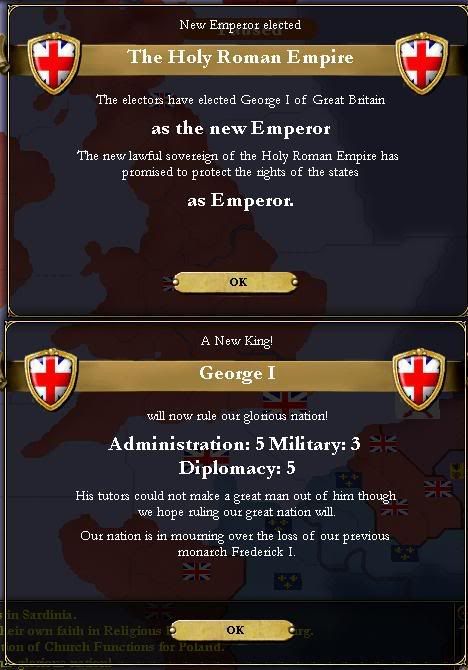
George I became regent in 1528, but his ambition and pride made him only a passable king.
After the reign of Frederick, however, few criticized his reign.

George I became regent in 1528, but his ambition and pride made him only a passable king.
After the reign of Frederick, however, few criticized his reign.
To distract Parliament and the kingdoms from these controversies, George turned the New England expedition into a grand spectacle, enlarging the scope beyond Frederick's plan. In January 1529 Oliver Talbot was placed in charge of the expedition and William Bedford in charge of the colonies and the several thousand troops that would protect them when they arrived. The journey west was long and arduous, but George arranged a deal with Portugal that could ameliorate it somewhat: in exchange for using their bases to resupply along the journey, the British agreed to re-take the Portuguese Azores, which had been in the hands of natives and rebels for the past several years.
After stopping in Lisbon, Talbot's fleet set out for the Azores, where in May the British regulars quickly dispersed the rebels, freed the governor and handed the islands back to the Portuguese. After refilling their ships once again, the expedition sailed for the New World. Unfortunately the Tremontana and Majestic took on water and the fleet had to make an emergency landing at the smaller northern colony of Conoy, where it sheltered over the winter. George's ambitious plans had not included enough preparation for the harsh colonial winters, and by the time spring came well over a thousand soldiers were dead from exposure, malnutrition and native attacks. The Muskogee tribe especially was aggressive that year, and the setbacks of the Tuscarosa colony that spring were blamed on them as well. George used these problems to beat the drums in London, telling Parliament repeatedly that there could be no peace as long as the savages threatened the British colonies.
George had many reasons to want war, but Indian attacks were not at the top of his list. Since he had assumed the role of Regent, Protestants in the United Kingdom had gained confidence and the heresy made headway in Northumberland and Glamorgan by the end of the year. Worse, in the north a peasants revolt broke out, with suspected Presbyterian sympathies. This heresy was far more dangerous than anything Dempier had devised; not only did it stress democracy, it rejected any hope of compromise with the Catholic church - still the religion of the majority of Britons. Later in the year, Ayrshire suffered a similar revolt, and British troops once again marched to fight their own people.
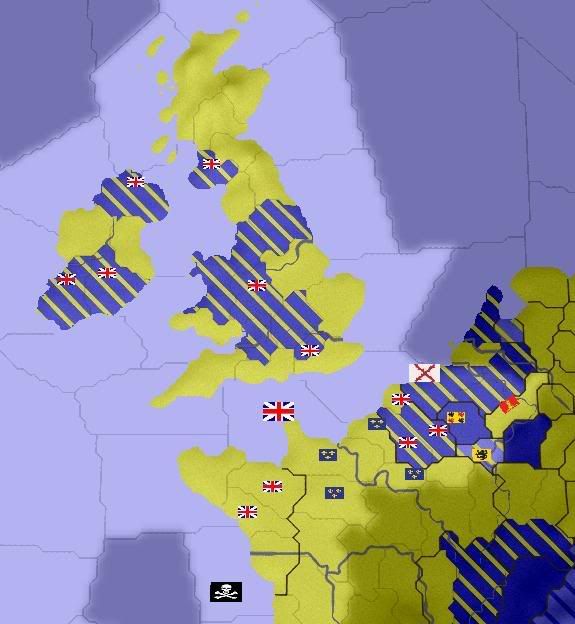
By 1528 the realm was firmly divided into Protestant and Catholic camps
The next year was very similar. The heresy spread to East Anglia, close to London. The election of a new pope in January caused demands for the British to burn all Protestant propaganda in the Kingdoms. Realizing the growing strength of Protestantism, George burned a few books to satisfy the church but made no real effort to stamp out heresy. Feeling betrayed, the queen argued with her Lord Protector, and when he had her shut in her apartments, spoke out publicly against him. In yet another misstep, Mathilda seems to have put her trust in George when he was simply using her. When the queen refused to back down, the tragic queen was bundled off to her family estates in Brittany, there to live the remainder of her days in enforced seclusion.
The Indian War
To distract the public from this scandal, the Lord Protector once again brought news from the colonies to the limelight: this time, the discovery of the Bahamas in December. Although it caught the public attention, the discovery was rather pointless; the islands were already claimed by Spain, with nearly ten thousand colonists living there, and within a few weeks the news had been forgotten. On New Year's Day 1531, things took a darker tone.
The regency was now beginning its third year and showed no signs of coming to an end. The emasculated Parliament bequeathed to George put up no real fight to his delays and obsfucations of the kingship issue. Simply tracing the lineages of all heirs took the council three years - a long time even in those days. In Lancashire, home of the House of Lancaster, several houses protested these delays by rising up in arms and demanding a king be crowned. This New Years Day Rebellion was savagely put down by the royal guard, but an ugly mood remained.
Still believing he could distract the public, George ordered Suffolk to attack the Muskogee in spring.
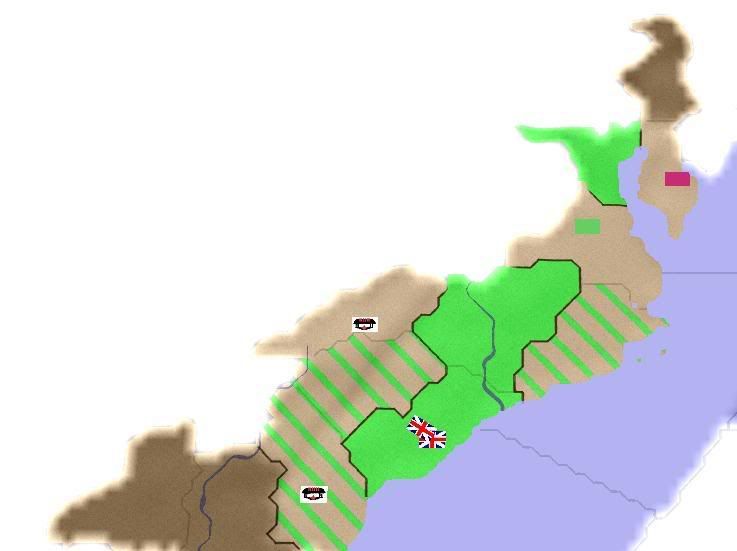
The Crown Colony of New England in 1528
Despite their portrayals in popular media, the Muskogee were neither innocent savages nor bloodthirsty enemies. They were, however, prepared for the British invasion. The Muskogee, Timucua and Creek had long been allies, and when British troops invaded their lands, their chief Yonaguska Cheasequah rallied his people to war. In retrospect, it was probably the worst decision he could have made: the massed Indian forces were no match for superior European guns. On the open field, the British regulars were unbeatable. By the end of March, the Muskogeans had been annihilated and the Timucua fled, leaving only the Creek to fight the advancing British troops.
Yonaguska had learned from his mistake, however. Using British ignorance of the terrain, he let them march into a trap. With 1,518 British troops in his lands, Yonaguska fell upon them with over 13,000 Muskogean and Creek warriors. In the dense woods, the battle was one-sided; 272 warriors lost their lives...but they took no prisoners. In one day the British army in New England had been decimated.
Under pressure to send good news home, Suffolk forced the Timucua to surrender, but the Creek continued to fight. Their warriors could disappear into the woods, only to return when the British left. Suffolk was wary of another trap and despite orders to bring a speedy end to the war, pushed only slowly into enemy territory.
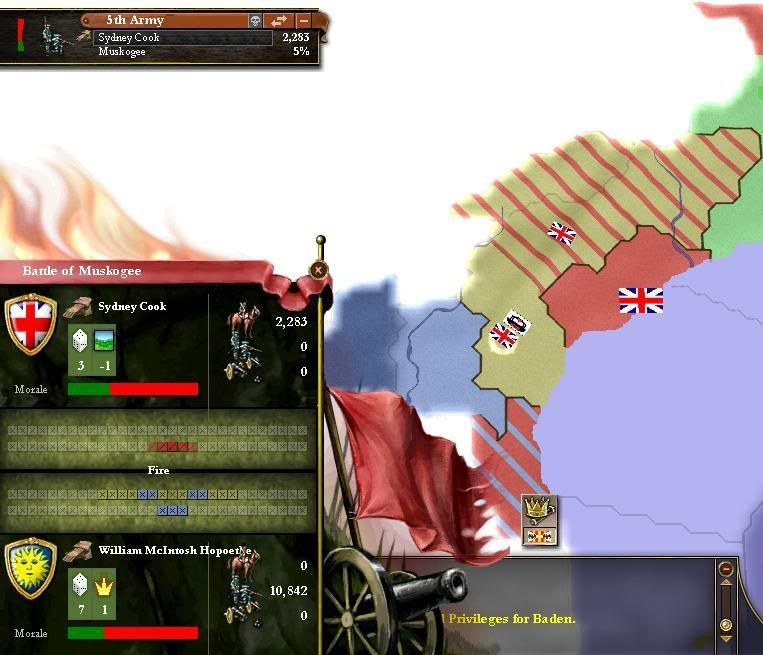
The second battle of Santee ended in a better result for the British
By January 1532 he was able to force the Creek to surrender Yamasee in a treaty, and the following spring Yonaguska finally signed a bitter peace with the invaders, giving up most of their territory at the stroke of a pen. The Indian War was over - and it was a tremendous victory, adding hundreds of miles of territory to New England and dealing a terrible blow to the natives. For many years afterwards New England was calm.
The Parliament of 1532
The same cannot be said of the home isles: In June heresy spread to Kent, while in September Connaught embraced Calvinism. By 1532 nearly half of the United Kingdom had embraced heresy in one way or another. Under severe pressure, George promised to bring the issue to an end. He recalled Parliament in a way not seen since Henry VI, giving it the powers and responsibilities taken from it by Charles I. At the same time, he expanded it to all the lands of the United Kingdoms. This was an extremely popular move: it was seen as fair by the peasants, fulfilled the promises of Charles II's United Kingdom, and showed that the Lord Protector was, in fact, willing to give up power.
It was also an extremely Machiavellian move. Heresy had been spreading throughout the United Kingdoms but the traditional powers of the land remained Catholic. When Parliament was recalled in April, the makeup was very different than many had realized.
Catholic representatives: 15 counts and dukes and 4 non-voting colonial governors
Protestant representatives: 15 counts and dukes
Presbyterian representatives: 1 count
The Catholics were caught by surprise, but the Protestants were not. Relying on the swing vote of Count Fearghas of Connaught, the 'Protestant Parliament' forced law after law through until on May 1st - still celebrated in Britain today by Protestants as "May Day", the United Kingdoms of Great Britain broke openly from Rome and embraced the heresy of Dempier.
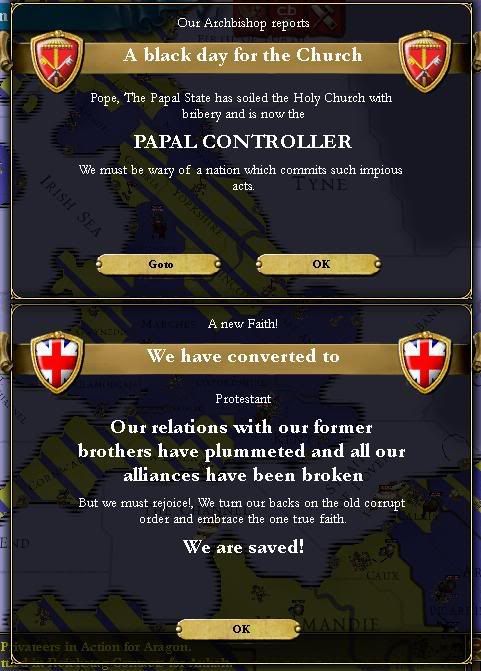
Great Britain converted to Protestantism in 1532
In the infamous Law #235, Parliament declared that only a follower of the state church could claim the throne of the United Kingdoms. In a single stroke all the Lancaster heirs to the throne were disqualified - except one.
Bowing to the will of Parliament, George Tudor humbly accepted the crown of the United Kingdoms as king. Showing how deeply he had been involved, royal troops immediately seized monasteries and closed down Catholic churches across the kingdom. With only minor protests, George managed to add a nice sum to the treasury and at the same time hurt his enemies in Parliament, still hanging by a single vote. King George was said to be busy putting Catholics on trial and purging the government of papists, while his treasury was full of stolen Catholic gold.
With stories like these circulating, it should come as no surprise that the Catholic response came swiftly. In July George and the United Kingdoms were excommunicated by Rome.
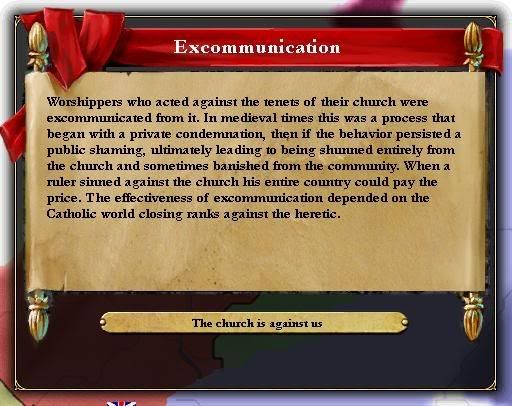
The Papal Bull of 1532 excommunicated not only George, but all of the United Kingdoms
Shocked by the Parliament, Portugal broke away from the United Kingdoms. George blithely ignored all this, but not everyone was so relaxed about things.
"Divine Retribution"
When British Catholics petitioned the pope for succor, the king of Castille agreed to carry the cross to London, with the help of his new allies: the Portuguese. Together the Iberian powers put together an armada that would bring 'Divine Retribution' to the Kingdoms for their heresy. Amidst great furor in Europe, George finally took notice of the danger the Kingdoms were in and placed Lord Suffolk in charge of the navy at home.
In February Aberdeen embraced the new state religion, while George sponsored an official English translation of the Bible for use by Protestants. As general John Boscawen retired in disgust at the new policies, the 'Spanish Armada' finally found its way to England. The two Iberian powers, so newly allied, found it hard to trust each other, and their forces found it impossible to coordinate in the North Sea. The British were able to isolate smaller fleets and sink them before they could join the main fleet, and in November the main fleet itself was crippled. By the end of 1533 twenty-five Spanish ships and Privateers had been sunk by Suffolk without a single British ship lost. If this was truly divine retribution, then it was unclear whose side God was on.
After this great victory, the crusade became a war of ships and spies. Castille and Portugal continued to harass British shipping and sponsor Privateers, but the British navy in turn continued to sink Spanish warships in retaliation - more than 10 a year, while British losses continued to be low thanks to Suffolk's 'Grand Fleet' strategy. Controversial in 1532, it allowed pirates to prey on the coasts while the British navy collected into a single force that could sink any smaller flotilla the Spanish sent against it. While smaller fishing villages suffered, the British navy thrived, and eventually chased away the invaders.
Backing down from a grand invasion, the Spaniards turned to the New World, where they held the advantage, and Spanish pirates attacked British colonies at will. In response, George I sent a task force of three ships of the line to the colonies, but along the way the HMS Hector sunk, the victim of Spanish pirates, and the small force was unable to keep the peace in the colonies effectively.
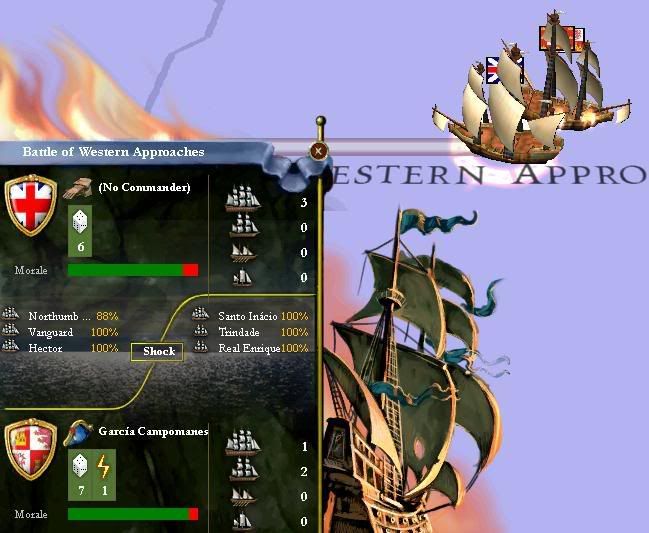
Ambushed in the Western Approaches, the task force became vulnerable to piracy and only two of its three warships reached New England
The war there did help bring maps of more Spanish territories in the New World; the northern coast of South America and the Caribbean, both Spanish strongholds. At home, the news of the armada's failure led many to give up and accept the inevitable, converting to the new state church. Not all did so, however; in Yorkshire, a particularly vehement Catholic revolt led by Lord Buckingham took a year to put down. Nevertheless, the tide had turned, and with it, Hesse, Brabant and Flanders all broke ranks with Rome. As Burgundy flailed around in a death spiral, its former vassals turned on it and managed to disembowel the once-great nation. Later, Sweden would join the Protestant ranks.

Protestantism was on the march in Europe in 1534
Castille and her allies were just as intransigent about the crusade as Frederick had been in his. With every year more monasteries were seized and the prospects of the Kingdoms returning to the Catholic church seemed smaller, but the Spanish refused to back down. Instead, they demanded the release of Catholic Ireland, which George laughed at. With the Castillian threat ended but war still raging, George decided to take advantage of the moment and, after the marriage of his son to a countess of Flanders, declared war on Burgundy. In response, nobles in Glochester rose up in protest, but the one-sided war was brief; the tiny Burgundian duchy could do little to stop the English invasion. Castille, on the other hand, sent a second armada to the North Sea and there Oliver Talbot's HMS Vanguard sunk Sebastio de Albuquerque's Santa Ana, ekeing out a costly victory for Britain.
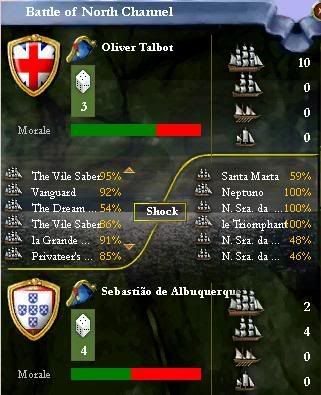
The Battle of the North Sea, 1536
By the Battle of the North Sea in 1536 it was clear that the constant wars were taking their toll. Sensing the inability of the British to keep order in the colonies, the Creek attacked New England. This was a strategic error on their part - although the British navy was having trouble keeping order, the British army there was stronger than ever, and after only a few months the Creek gave up their claims to New England. The Muskogee continued to fight, but after the Battle of Santee, Muskogean forces were left in tatters and that spring were forced to pay tribute. The colonies used the money to build a series of forts along the frontier, realizing the peace could be shattered at any time. At the same time, the war in Burgundy came to a decisive end, and the once-great duchy gave up nearly everything in the treaty of Bourgogne, although George I was forced to return Breda to Brabant or risk opening another front, this time with the Holy Roman Empire.
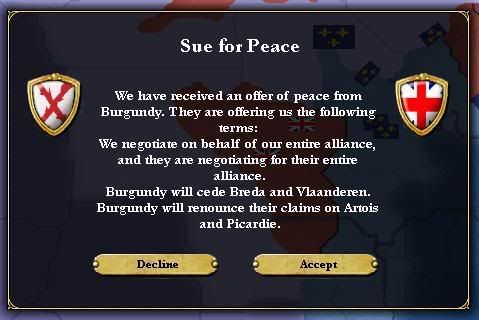
The one-sided Treaty of Bourgogne
In the same treaty, the Castillians finally agreed to an uneasy peace over the protests of the pope. The crusade was over, and finally the United Kingdoms were at peace! Although it was not the decisive victory that some had hoped for, it was a recognition that Protestant Britain was there to stay. Divine Retribution seemed to have lost its teeth, and Britain had gained a new confidence - and new lands - on the Continent. So, when Flanders began spreading Presbyterian literature to England in 1538, the United Kingdoms invaded and annexed the tiny but crucial trading center.
By the death of George I in 1542, over half of all subjects in the United Kingdoms had embraced the new Protestant faith, especially in England. Brittany and Scotland were Catholic strongholds, as were some of the colonies - but the new colony of Georgia, named after the king, was resoundingly Protestant in nature, and King George I had assured his place in the history of our great nation...for good or for ill.
The United Kingdoms at a Glance in 1542
Treasury: 195 million ducats
Estimated GDP: 946.8 million ducats
Standing Army: 37,000 Maurician infantry and 13,000 knights
Reserves: 58,000
Royal Navy: 10 caravels and 5 flytes
Prestige: 2nd highest (98.5)
Reputation: Rather Bad (13.8/22)
Last edited:

